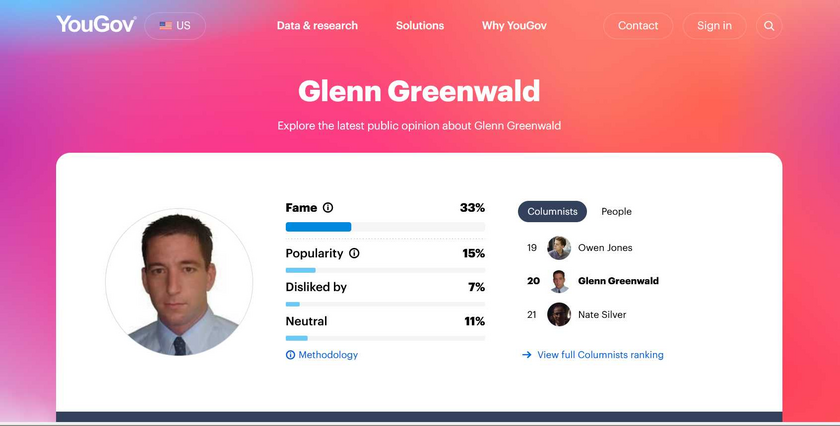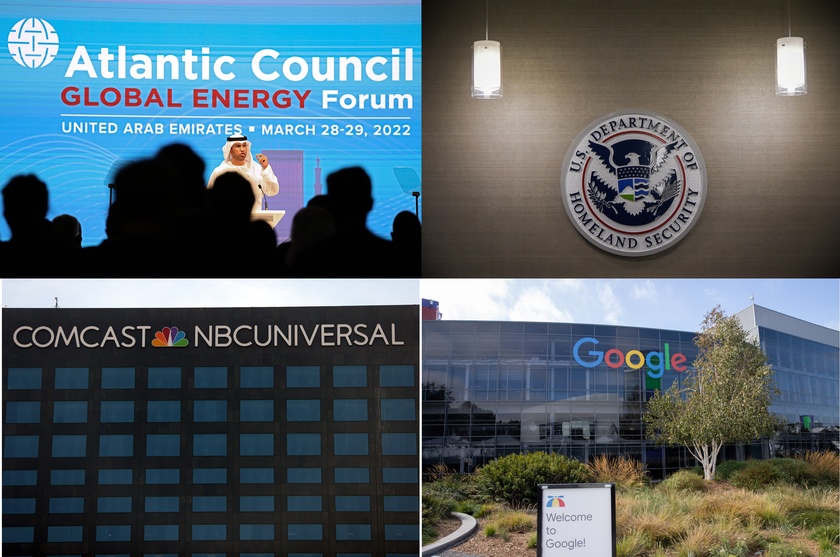
This article was originally published on Substack on Oct. 28, 2022
The rapid escalation of online censorship, and increasingly offline censorship, cannot be overstated. The silencing tactic that has most commonly provoked attention and debate is the banning of particular posts or individuals by specific social media platforms. But the censorship regime that has been developed, and which is now rapidly escalating, extends far beyond those relatively limited punishments.
The Consortium of State and Corporate Power
There has been some reporting — by me and others — on the new and utterly fraudulent “disinformation” industry. This newly minted, self-proclaimed expertise, grounded in little more than crude political ideology, claims the right to officially decree what is “true” and "false” for purposes of, among other things, justifying state and corporate censorship of what its “experts” decree to be "disinformation.” The industry is funded by a consortium of a small handful of neoliberal billionaires (George Soros and Pierre Omidyar) along with U.S., British and EU intelligence agencies. These government-and-billionaire-funded “anti-disinformation” groups often masquerade under benign-sounding names: The Institute for Strategic Dialogue, The Atlantic Council's Digital Forensics Research Lab, Bellingcat, the Organized Crime and Corruption Reporting Project. They are designed to cast the appearance of apolitical scholarship, but their only real purpose is to provide a justifying framework to stigmatize, repress and censor any thoughts, views and ideas that dissent from neoliberal establishment orthodoxy. It exists, in other words, to make censorship and other forms of repression appear scientific rather than ideological.
That these groups are funded by the West's security state, Big Tech, and other assorted politically active billionaires is not speculation or some fevered conspiracy theory. For various legal reasons, they are required to disclose their funders, and these facts about who finances them are therefore based on their own public admissions. So often the financing is funneled through well-established front groups for CIA, the State Department and the U.S. National Security State, such as “National Endowment for Democracy.”
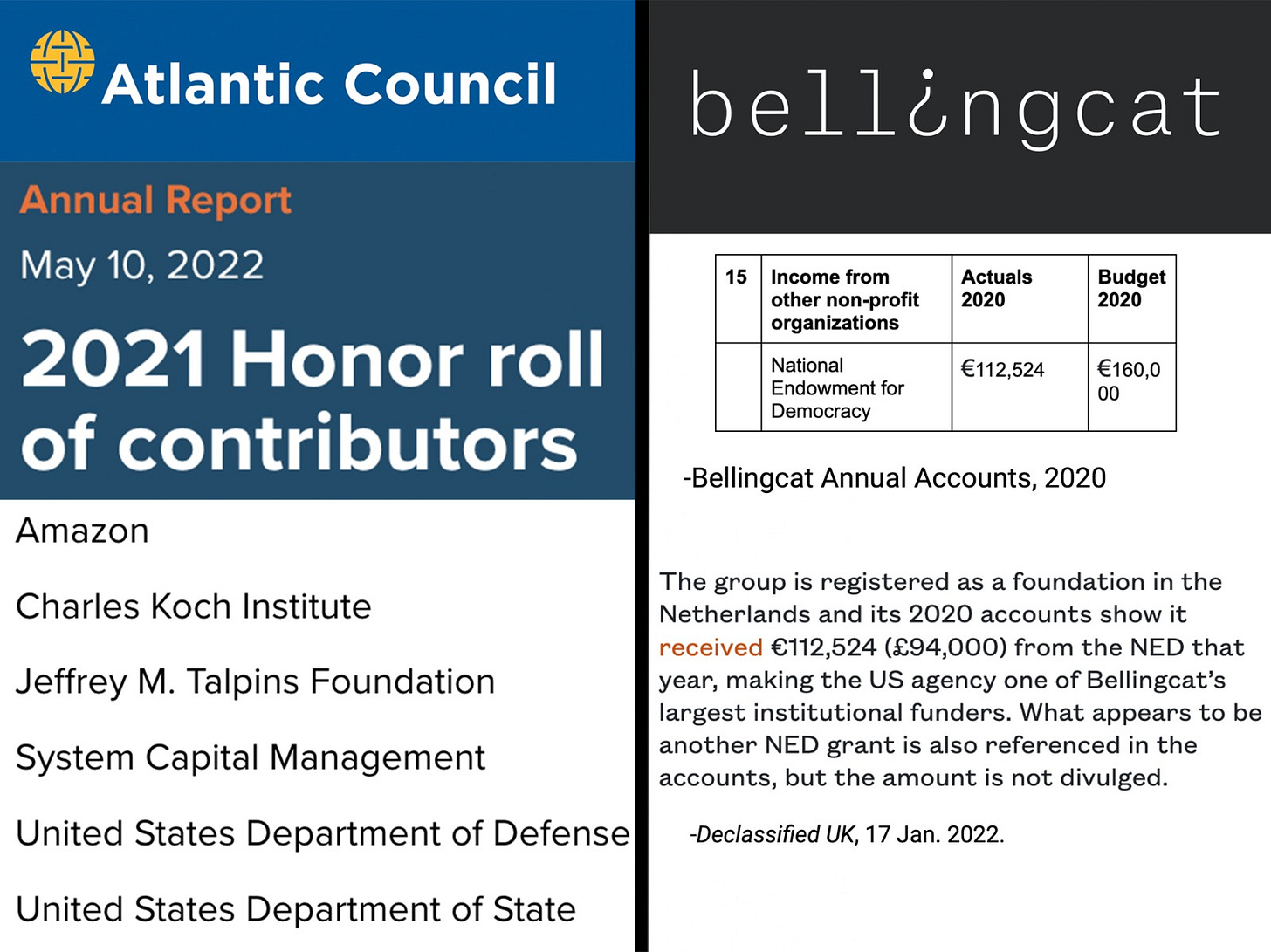
As has always happened with censor-happy tyrants throughout history, the more centers of power inject themselves with the intoxicating rush of silencing their adversaries, the more intense the next hit has to be. Every movement that has wielded censorship as a political weapon tells itself the same story to justify it. In ordinary times, they will casually recite, free speech is a vital value. But these are no ordinary times in which we are living. Our enemies and their ideas are different. They are uniquely hateful, false, inflammatory, and dangerous. The ideas they espouse will destabilize society, cause direct harm to others, deceive people, and incite violence against institutions of authority and their followers. Thus, they reason, we are actually not censoring at all. We are simply preventing evil people from doing harm to society, the government, and to citizens.
Look to any government or society in which censorship prevailed — either today or throughout history. This narrative about why censorship is not just justified but morally necessary is always present. Nobody wants to think of themselves as a censorship supporter. They need to be supplied with a story about why they are something different, or at least why the censorship they are led to support is uniquely justified.
And it works because, in the most warped sense possible, it appeals to reason. If one really believes, as millions of American liberals do, that the U.S. faces two and only two choices — either (1) elect Democrats and ensure they rule or (2) live under a white nationalist fascist dictatorship — then of course such people will believe that media disinformation campaigns, censorship, and other forms of authoritarianism are necessary to ensure Democrats win and their opponents are vanquished. Once that self-glorifying rationale is embraced — our adversaries do not merely disagree with us but cause harm with the expression of their views — then the more suppression, the better. And that is exactly what is happening now.
Banishment From the Financial System
One of the latest, and perhaps most disturbing, new frontiers of censorship is the escalating means of excluding citizens from the financial system as extra-judicial punishment for expressing views or engaging in political activism disapproved of by establishment power. In one sense, this is not new.
In 2012, I co-founded the group Freedom of the Press Foundation (FPF) — along with the Oscar-winning CitizenFour director Laura Poitras, Pentagon Papers whistleblower Daniel Ellsberg and others. The creation of that group was in response to the 2010 demands made by then-Sen. Joseph Lieberman (D-CT), in his capacity as Chairman of the Senate Homeland Security Committee, along with other war hawks in both parties, that financial services companies such as the online payment processor PayPal, credit card companies MasterCard and Visa, and the Bank of America all terminated the accounts of WikiLeaks as punishment for the group's publication of the Iraq and Afghanistan war logs: a trove of documents which proved systemic war crimes and lying by the U.S. Security State and its allies. Watching U.S. national security state officials pressure and coerce private companies over which they exert regulatory control to destroy their journalistic critics is exactly what is done in the tyrannies we are all conditioned to despise.
All of those corporations obeyed, thus preventing WikiLeaks from collecting donations from the public even though the group had never been charged with, let alone convicted of, any crimes. Amazon then booted WikiLeaks off of its hosting platform, removing the group from the internet for weeks. This was nothing less than extra-legal banishment of WikiLeaks from the financial system. We created FPF in order to circumvent that ban by collecting donations for WikiLeaks and then passing those funds to the group. When I announced the group's creation in a 2012 Guardian article, and while reporting on these pressure campaigns against WikiLeaks in a separate Guardian article, I explained how dangerous it would be if the U.S. Government could simply prohibit any journalistic groups it dislikes from participating in the financial system without even charging them with a crime:
So this was a case where the US government - through affirmative steps and/or approving acquiescence to criminal, sophisticated cyber-attacks - all but destroyed the ability of an adversarial group, convicted of no crime, to function on the internet. Who would possibly consider that power anything other than extremely disturbing? What possible political value can the internet serve, or journalism generally, if the US government, outside the confines of law, is empowered - as it did here - to cripple the operating abilities of any group which meaningfully challenges its policies and exposes its wrongdoing?. . . In sum, [by forming FPF], will render impotent the government's efforts to use its coercive pressure over corporations to suffocate not only WikiLeaks but any other group it may similarly target in the future.
Last week — in response to numerous reports this year of PayPal's expanding use of expulsion from the financial system as punishment for what it deems “extremist” political views and activities — the tech investor Stephen Cole recalled this then-unprecedented 2010 silencing campaign against WikiLeaks that was led by PayPal. Cole wrote: “I was an engineer at eBay/PayPal when PayPal censored donations to Wikileaks in 2010. That’s the first time I remember wondering… are we sure we’re the good guys?”
Back in 2010, this ominous tactic was depicted as just a one-time exception, an isolated case for a particularly threatening group (WikiLeaks). But in the last year, there is no question that exclusion from the financial system is becoming the tool of choice for Western censors in both the public and private sector, who work together — just as Big Tech and the U.S. Security State do — to identify and punish dissidents too dangerous to be permitted to speak.
The most alarming harbinger of this tactic came in February of this year when Canadian Prime Minister Justin Trudeau issued an emergency decree granting himself the power to freeze the bank accounts of any Canadian citizen who he determined, in his sole discretion, was participating in or otherwise supporting the truckers’ protest against vaccine mandates and passports. As a result of Trudeau's extraordinary seizure of unchecked power, “Canadian banks froze about $7.8 million (US $6.1 million) in just over 200 accounts under emergency powers meant to end protests in Ottawa and at key border crossings.” The BBC called this tactic “unprecedented,” as it empowers the Prime Minister to freeze the personal bank accounts of anyone “linked with the protests …. with no need for court orders.” If it is not considered "despotic” for a political leader to wield the power to unilaterally seize the personal funds of citizens as punishment for peaceful protests against the government's policies, then nothing is.
But this tactic worked to end the peaceful protest which Trudeau opposed — people cannot survive if they cannot access their funds or participate in the financial system — and it is thus now being aggressively expanded. Perhaps the leading weaponizer is PayPal. Last year, PayPal announced a new partnership with the Anti-Defamation League (ADL), a once-respected group that battled anti-Semitism and defended universal civil liberties, before becoming yet another standard liberal Democratic Party activist group devoted to censoring adversaries of neoliberal orthodoxy (the ADL has, just as one example, repeatedly demanded the firing of America's most-watched host on cable news, Fox News's Tucker Carlson). The stated purpose of this PayPal/ADL partnership was “to investigate how extremist and hate movements in the United States take advantage of financial platforms to fund their criminal activities,” with the ultimate goal of “uncovering and disrupting the financial flows supporting [what the ADL claims are] white supremacist and anti-government organizations.”
But predictably — indeed, by design — this “partnership” was nothing more than an ennobling disguise to enable PayPal to begin terminating all sorts of accounts of people and businesses who expressed political views disliked by its executives. Over the past year, a wide range of individuals have had their PayPal accounts canceled due solely to disapproved political views and activism.
The lesbian activist Jaimee Michell was notified by PayPal last month that the account of her activist group, Gays Against Groomers, was being immediately canceled due to unspecified rules violations. Moments later, the group — created by gay men and lesbians to oppose attempts by trans activists to teach trans dogma and highly controversial gender ideology to young schoolchildren — was notified that their account with PayPal's subsidiary, Venmo, was also canceled immediately, leaving them with few options to continue to collect donations. Around the same time, the British anti-woke and right-wing commentator Toby Young, who had created a group called the Free Speech Union to oppose speech-based cancellations of accounts, was notified by PayPal that the group's account, used to accept donations, was also being cancelled; though PayPal refused to notify Young of the reason for the cancellation, it told The Daily Mail "it was trying to balance ‘protecting the ideals of tolerance, diversity and respect’ with the values of free expression.”
At the time of his PayPal expulsion, Young had become a vocal opponent of the U.K. Government's escalating involvement in the war in Ukraine. Two of the sites on which this long-time right-wing figure relied for his opposition to NATO involvement in Ukraine were MintPress and Consortium News, two populist left-wing sites long devoted to anti-war and anti-imperialism policies. Several months earlier, those two anti-establishment left-wing sites were notified by PayPal that their accounts were being immediately closed, and that the balances in their account would be seized and may never be returned. PayPal refused to tell either news site, or Coinbase, which reported on the account closures, what its reasons were. It was just an arbitrary decree by unseen authorities who not only closed their accounts but threatened to seize their donations without bothering to provide a reason. Now that is real tyrannical power. MintPress writer Alan MacLeod said that “this is a warning shot fired at anyone even remotely antiestablishment,” adding that “alternative media operations run on shoestring budgets and rely on enormous corporations like PayPal to operate correctly. If they can do this to us, they can do it to you.”
Earlier this month, PayPal announced that it would fine account holders $2,500 if, in PayPal's sole discretion, it was determined that those users were guilty of “promoting misinformation.” In other words, PayPal would just steal their own users’ funds from their account as extra-judicial punishment for the expression of views that PayPal — presumably working in conjunction with liberal activists groups such as ADL and billionaire-funded “disinformation experts” — decrees to be false or otherwise unacceptable. When this new policy provoked far more anger than PayPal evidently anticipated, they claimed it was all just a big mistake — as if some PayPal computer on its own accidentally manufactured a policy advising users about this seizure of funds. Regardless of whether PayPal returns to this policy — and there are, as Forbes noted, some unconfirmed reports that it is starting to do so — the intent is clear, because it is so consistent with so many other new frameworks: fortifying a multi-faceted regime of state and corporate power to silence and punish dissent.
Union of Big Tech, U.S. Security State and Corporate Media Giants
In May, the Department of Homeland Security's attempted appointment of a clearly deranged partisan fanatic, Nina Jankowicz, to effectively serve as “disinformation czar” sparked intense backlash. But liberal media corporations — always the first to jump to the defense of the U.S. Security State — in unison maligned the resulting anger over this audacious appointment as “itself disinformation,” without ever identifying anything false that was alleged about Jankowicz or the DHS program.
Though anger over this classically Orwellian program was obviously merited — it was, after all, an attempt to assign to the U.S. National Security State the power to issue official decrees about truth and falsity — that anger sometimes obscured the real purpose of the creation of this government program. This was not some aberrational attempt by the Biden administration to arrogate unto itself a wholly new and unprecedented power. It instead was just the latest puzzle piece in the multi-pronged scheme — created by a union of U.S. Security State agencies, Democratic Party politicians, liberal billionaires, and liberal media corporations — to construct and implement a permanent and enduring system to control the flow of information to Western populations. As importantly, these tools will empower them to forcibly silence and otherwise punish anyone who expresses dissent to their orthodoxies or meaningful opposition to their institutional interests.
That these state and corporate entities collaborate to control the internet is now so well-established that it barely requires proof. One of the first and most consequential revelations from the Snowden reporting was that the leading Big Tech companies — including Google, Apple and Facebook — were turning over massive amounts of data about their users to the National Security Agency (NSA) without so much as a warrant under the state/corporate program called PRISM. A newly obtained document by Revolver News’ Darren Beattie reveals that Jankowicz has worked since 2015 on programs to control “disinformation” on the internet in conjunction with a horde of national security state officials, billionaire-funded NGOs, and the nation's largest media corporations. Ample reporting, including here, has revealed that many of Big Tech's most controversial censorship policies were implemented at the behest of the U.S. Government and the Democratic-controlled Congress that openly threatens regulatory and legal reprisals for failure to comply.
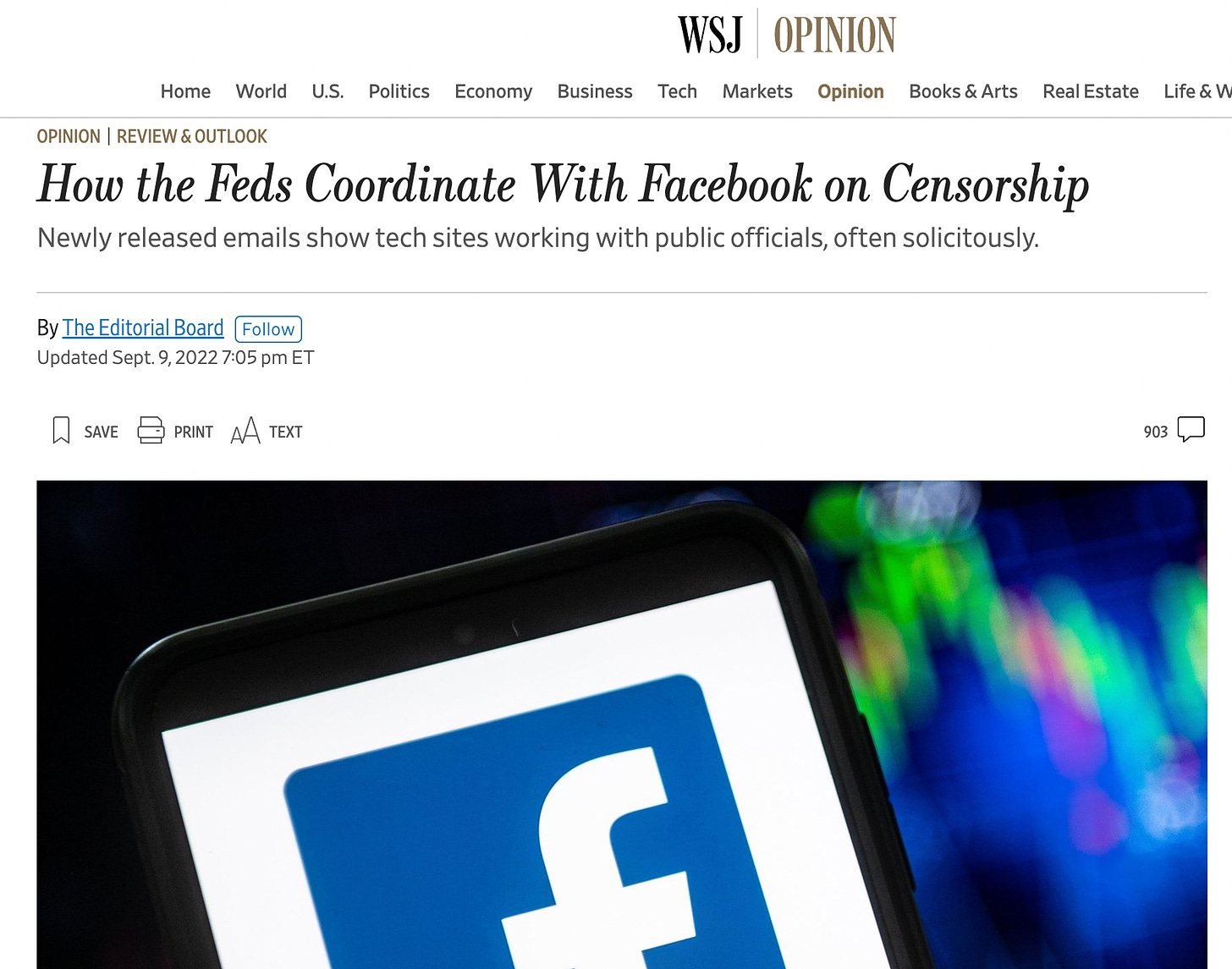
Every newly declared crisis — genuine or contrived — is immediately seized upon to justify all new levels and types of online censorship, and increasingly more and more offline punishment. One of the core precepts of the Russiagate hysteria was that Trump won with the help of Russia because there were insufficient controls in place over what kind of information could be heard by the public, leading to new groups devoted to "monitoring” what they deem disinformation and new policies from media outlets to censor reporting of the type that WikiLeaks provided about the DNC and Clinton campaign in 2016. This censorship frenzy culminated in the still-shocking decision by Twitter and Facebook to censor The New York Post's reporting on Joe Biden's activities in China and Ukraine based on documents from Hunter Biden's laptop that most media outlets now acknowledge were entirely authentic — all justified by a CIA lie, ratified by media outlets, that these documents were “Russian disinformation.”
The riot at the Capitol on January 6 was used in similar ways, though this time not merely to un-person dissidents from the internet but also to use Big Tech's monopoly power to destroy the then-most-popular app in the country (Parler) followed by the banning of the sitting elected President himself, an act so ominous that even governments hostile to Trump — in France, Germany, Mexico and beyond — warned of how threatening it was to democracy to allow private monopolies to ban even elected leaders from the internet. Liberal outlets such as The New Yorker began openly advocating for internet censorship under headlines such as “The National-Security Case for Fixing Social Media.”
The COVID pandemic ushered in still greater amounts of censorship. Anyone who urged people to use masks at the start of the pandemic was accused of spreading dangerous disinformation because Dr. Anthony Fauci and the WHO insisted at the time that masks were useless or worse. When Fauci and WHO decided masks were an imperative, anyone questioning that decree by insisting that cloth masks were ineffective — the exact view of Fauci and WHO just weeks earlier — was banned from Big Tech platforms for spreading disinformation; such bans by Google included sitting U.S. Senators who themselves are medical doctors. From the start of the pandemic, it was prohibited to question whether the COVID virus may have leaked from a lab in Wuhan — until the Biden administration itself asked that question and ordered an investigation to find out, at which point Facebook and other platforms reversed themselves and announced that it was now permissible to ask this question since the U.S. Government itself was doing so.
In sum, government agencies and Big Tech monopolies exploited the two-year COVID pandemic to train Western populations to accept as normal the rule that the only views permitted to be heard were those which fully aligned with the views expressed by institutions of state authority. Conversely, anyone dissenting from or even questioning such institutional decrees stood accused of spreading "disinformation” and was deemed unfit to be heard on the internet. As a result, blatant errors and clear lies stood unchallenged for months because people were conditioned that any challenging of official views would result in punishment.
We are now at the point where every crisis is seized upon to usher in all-new forms of censorship. The war in Ukraine has resulted in escalations of censorship tactics that would have been unimaginable even a year or two ago. The EU enacted legislation legally prohibiting any European company or individual from broadcasting Russian state-owned broadcasters (including RT and Sputnik). While such legal coercion would (for now) almost certainly be banned in the U.S. as a violation of the First Amendment's guarantee of free speech and free press rights, non-EU companies that decided in the name of open debate to allow RT to be heard — such as Rumble — have faced a torrent of threats, pressure campaigns, media attacks and various forms of retribution.
One of the easiest and surest ways to be banned these days from Big Tech platforms is to reject the core pieties of the CIA/NATO/EU view of the war in Ukraine, even if that dissent entails simply affirming the very views which Western media outlets spent a decade itself endorsing, until completely changing course at the start of the war — such as the fact that the Ukrainian military is dominated by neo-Nazi battalions such as Azov, especially in the Eastern part of the country. Regardless of one's views on the Biden administration's involvement in this war, surely it requires little effort to see how dangerous it is to try to impose a full-scale blackout on challenges to U.S. war policy, especially given the warning by Biden himself that this war has brought the world closer to nuclear armageddon than at any time since the 1962 Cuban Missile Crisis.
It cannot be overstated how closely aligned Big Tech censorship is with the agenda of the U.S. Security State. And it is not hard to understand why. Google and Amazon receive billions in contracts from the CIA, NSA and Pentagon, and, as we reported here in April, the most vocal lobbyists working to preserve Big Tech monopoly power are former Security State operatives. Illustrating this alignment, Facebook — at the start of the war in Ukraine — implemented an exception to its rule banning praise for Nazi groups by exempting the Azov Battalion and other neo-Nazi Ukrainian militias.
This regime of censorship is anything but arbitrary. Its core function is to shield propaganda that emanates from ruling class centers of power from critique, challenge and opposition. It is designed to ensure that Western populations hear only the assertions and proclamations of state and corporate elites, while their adversaries and critics are at best marginalized (with warnings labels and other indicia of discredit) or banned outright.
Pro-Censorship Corporate “Journalists”
No discussion of this growing and limitlessly dangerous censorship regime would be complete without noting that central role played by the West's largest media corporations and their largely-millennial, censorship-obsessed liberal employees who bear the deceitful corporate Human Resources job title of “journalist.” The most beloved journalists of modern-day American liberalism are not those who divulge the secret crimes of CIA, or the chronic lies that emanate from the Pentagon and other arms of the U.S.'s endless war machine, or monopolistic abuses of Big Tech. Indeed, journalists who do that work — challenging and exposing the secrets of actual power centers — are the ones most hated by liberals in light of their adoration for those institutions. That is what explains their support for Julian Assange's ongoing imprisonment and Edward Snowden's ongoing exile as the only way to avoid the same fate as Assange is suffering.
Today's journalistic icons of American liberalism are not those who confront establishment power but rather serve it: by relentlessly attacking ordinary citizens as punishment for expressing views declared off-limits by these journalists' establishment masters. As I have previously reported, there is a horde of corporate employees at media behemoths with the classic mindset of servants of petty tyrants, whose only function — and passion — is to troll the internet searching for upsetting dissent, and then agitate for its removal by centers of corporate powers: NBC News’ disinformation unit employees Ben Collins and Brandy Zadrozny; The Washington Post's “online culture” columnist Taylor Lorenz; and the New York Times’ tech reporters (Mike Isaac, Ryan Mac and countless others). At the time I first reported on what they are assigned to do, I dubbed this “tattletale journalism": the fixation with demanding the immediate cessation of “unfettered conversations” and the constant attempt to confront and expose ordinary citizens for the crime of expressing prohibited views.
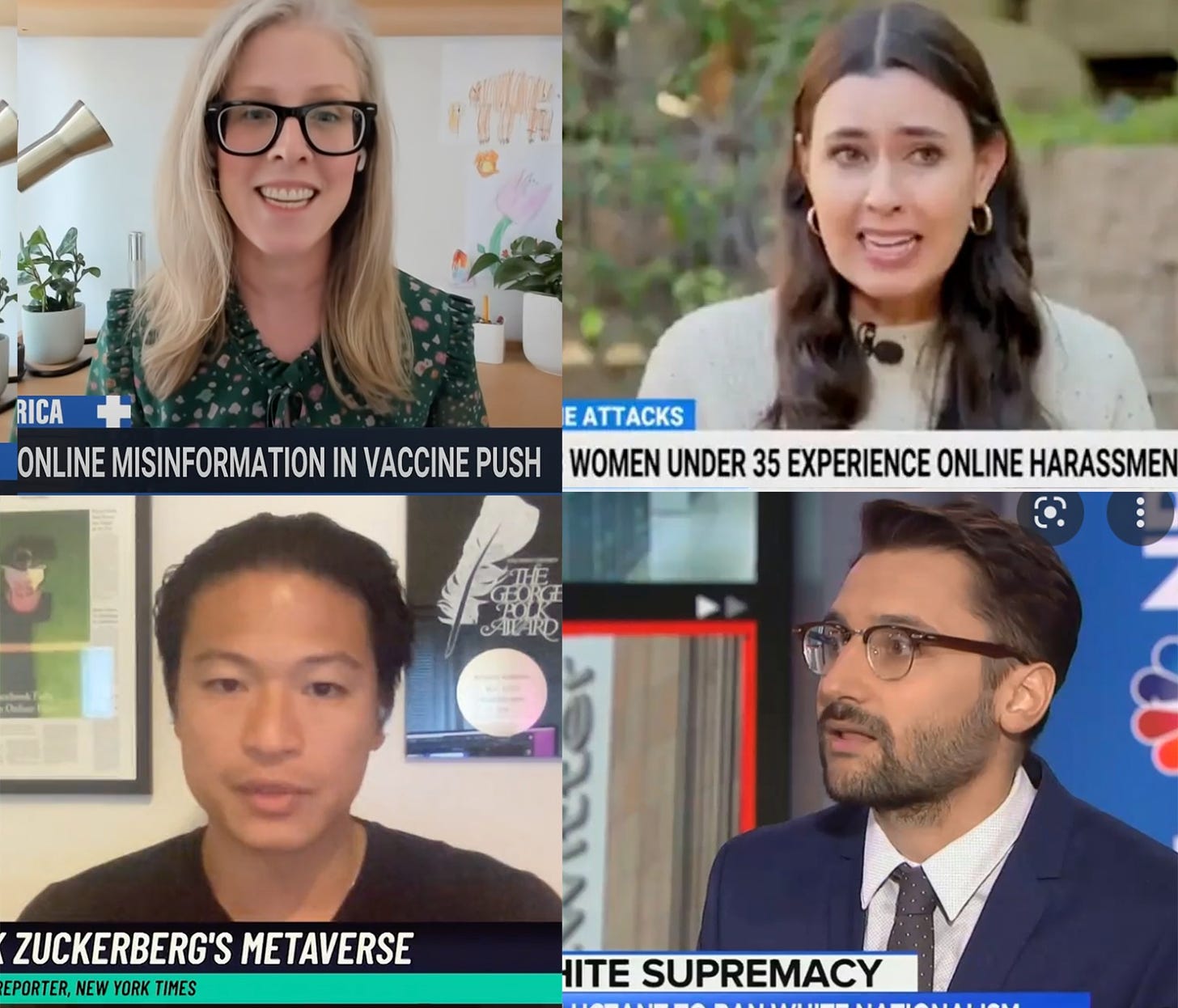
In September, Matthew Price, CEO of Cloudflare — a major tech company that provides services constituting the backbone of the internet, including security protections — refused to capitulate to the pressure campaign to cancel the site called KiwiFarms. The cancellation demands were based in the claim that the forum was allowing "harassment” and doxing of a Twitch streamer named "Keffals,” whom Lorenz in The Washington Post — under the headline “The trans Twitch star delivering news to a legion of LGBTQ teens” — had months earlier christened the Patron Saint of Trans Victimhood. Price, the CEO, warned that because Cloudflare is a security company and a hosting service, not a social media site, it would be extremely dangerous for them to start closing accounts based on public dislike of the content that appears on those sites. This is how he explains the company's steadfast refusal to capitulate to censorship demands — such cancellations, he explained, would be akin to demanding that AT&T refuse telephone service to right-wing commentators by arguing that they use their telephones to spread harmful views:
Some argue that we should terminate these services to content we find reprehensible so that others can launch attacks to knock it offline. That is the equivalent argument in the physical world that the fire department shouldn't respond to fires in the homes of people who do not possess sufficient moral character. Both in the physical world and online, that is a dangerous precedent, and one that is over the long term most likely to disproportionately harm vulnerable and marginalized communities.
Today, more than 20 percent of the web uses Cloudflare's security services. When considering our policies we need to be mindful of the impact we have and precedent we set for the Internet as a whole. Terminating security services for content that our team personally feels is disgusting and immoral would be the popular choice. But, in the long term, such choices make it more difficult to protect content that supports oppressed and marginalized voices against attacks.
But Cloudflare's refusal to capitulate to censorship advocates infuriated NBC News’ Ben Collins — whose primary purpose in life is to agitate for greater and more repressive control over the internet to stifle views that deviate from establishment liberalism — and, along with his NBC colleague and fellow censorship advocate Kat Tenbarge, used the massive corporate platform of NBC News to pressure Cloudflare to obey, claiming Cloudflare's refusal to censor on command endangers trans people. Within less than 24 hours of the publication of Collins’ article — blasted to millions of people across the various platforms owned by NBC and Collins’ corporate owner, the Comcast Corp. — the CEO of this powerful company reversed himself, groveling before the media's censorship advocates and vowing that this would be a one-time exception. “This is an extraordinary decision for us to make and, given Cloudflare's role as an Internet infrastructure provider, a dangerous one that we are not comfortable with,” he wrote, as he announced that he would do it anyway (it will, needless to say, be the opposite of a one-time exception, since any millennial censor at The Huffington Post or Vox can now easily force Cloudflare to keep censoring by exploiting this new precedent with new articles about their censorship target using the “worse-than-Kiwifarms” formulation).
And thus did this corporate "journalist” once again usher in a brand new escalation in the strengthening censorship regime: tinkering with the infrastructure of the internet to expel sites and people anathema to liberal pieties. As usual, not just liberals but also the left cheered this forced capitulation, as they are somehow convinced that the world will be a better place when the power to silence voices and ideas is in the collective hands of the U.S. Security State, their oligarchical partners who own Big Tech, and their servants who masquerade as "journalists” deep within the bowels of the West's largest media corporations. Polls leave no doubt that Democrats are vastly more supportive of internet censorship not only by large corporations but also by the state, and that is the mindset that asserts itself over and over to cheer these censorship schemes by the West's most powerful institutional actors.
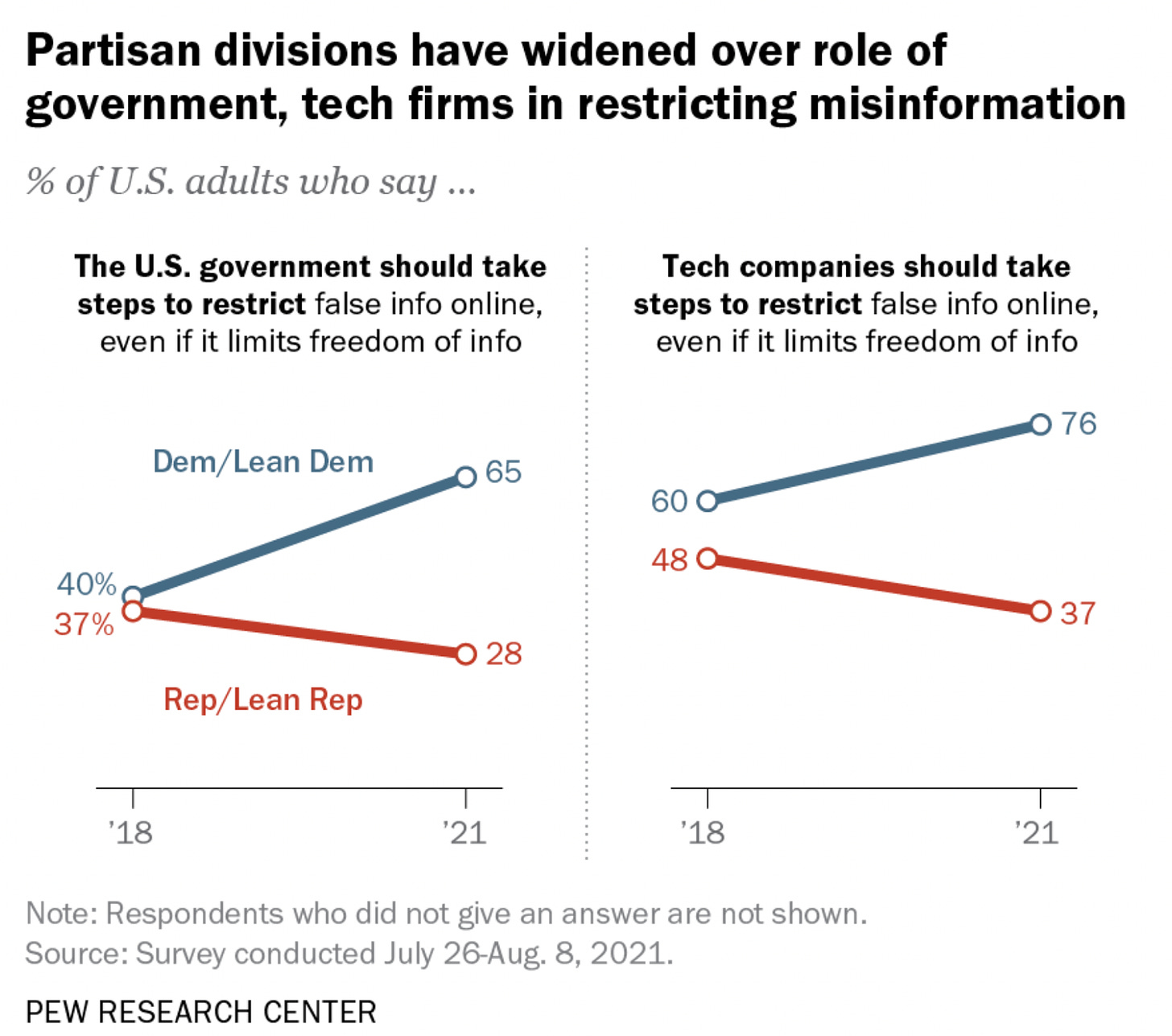
This is the regime of censorship whose tentacles grow each month and whose power expands inexorably. Like all censors, the consortium that controls and funds this regime recognizes that whoever controls the flow of information will wield unchallenged power, and that few powers are more potent and tyrannical than the ability to relegate one's critics to the most distant fringes or to silence them altogether.
Our New Nightly Live Program on Rumble
Any article that simply reports on these vital developments with free speech and systemic censorship is, by itself, journalistically worthwhile, even necessary. With so many Western corporate journalists supportive of or (at best) indifferent to the grave dangers this system imposes, the truth behind this censorship regime — who is constructing it and for what purposes — is far too rarely revealed. Any news article reporting on the component parts of this escalating regime would be inherently valuable.
But when it comes to this sinister regime of information control, I long ago ceased believing it sufficient merely to report on it. I regard the need to fight against this regime of censorship, to destabilize and subvert it, and ultimately to defeat it as a paramount cause, the journalistic and political cause I prioritize above all others. Little is possible, including meaningful journalism, if we are prevented from being heard, if our discourse is strictly controlled and policed by the very power centers our rights allow and encourage us to challenge. Few other values can be defended, and few other injustices exposed and combated, if ruling class elites continue to acquire the defining tyrannical power of information control and silencing of dissent.
Action, not just words, is required. That is why I have been devoting myself to supporting only those sites and companies genuinely determined to resist pressures and other forms of coercion to censor on behalf of Western establishment institutions, and instead to preserve and fortify spaces for free speech and free inquiry online, with the ability to reach large numbers of people. It does nobody any good — other than one's adversaries — if one willingly ghettoizes oneself into fringe and marginalized precincts. What is required is a cause-driven commitment to free speech along with the strategic ability to attract large audiences — and that, to me, means doing my journalism only on platforms with a demonstrated commitment to these values and an demonstrated ability to reach large numbers of people.
For this reason, the platforms with which I have worked over the past two years are ones that have proven not just a willingness but an eagerness to express defiant contempt for these censorship pressures and an impressive commitment to ensuring free expression: Substack for written journalism, Callin for podcasts, and Rumble for video journalism. Each has been the target of pressure campaigns of the type that caused the Cloudflare CEO so pathetically to reverse his own refusal to obey censorship orders after less than a day. Each of these platforms has refused to accede to these demands in the way that Cloudflare and so many others before it have done. That is precisely what is needed to subvert the growing censorship regime: people and companies that simply refuse to obey.
Rumble in particular has been the target of intense attacks — in part because it agreed to allow RT to broadcast on its platform in order to protest the EU's outlawing of that network and thus incurred the wrath of the Russia-obsessed corporate media, but also because it has experienced massive growth largely as the result of growing anger toward Big Tech censorship. Rumble has begun attracting not only political commentators banished in unison by Big Tech — such as the recent banning Andrew Tate, who promptly moved his large audience to Rumble — but also cultural commentators and Gen Z personalities increasingly angry at the repressive climate imposed by Google on its YouTube platform. This is driving more and more growth to the platform, which in turn is causing establishment media corporations to devote more and more energy to disparaging it.
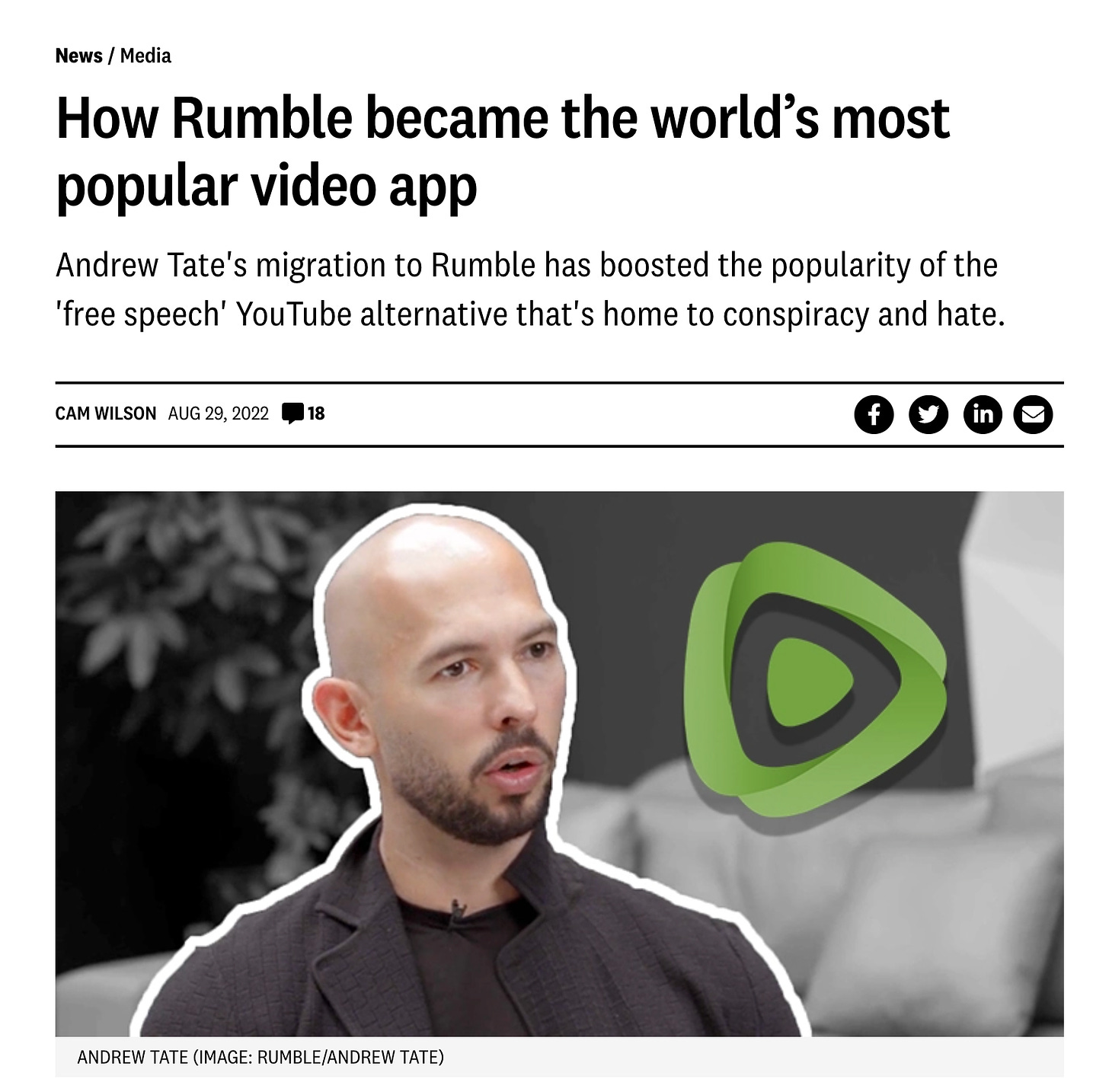
Rumble's lawsuit against Google for antitrust violations — alleging that Google is using its market dominance of search engines to hide Rumble videos in order to protect Google's YouTube — created a significant win for Rumble, as we reported here in August, as the judge refused Google's request to dismiss the lawsuit. That ruling allows Rumble to obtain invasive discovery about how Google manipulates its search engine algorithms, and for whose benefit.
As a result of what appeared to be the genuine commitment of Rumble's founders to the cause of free speech and anti-censorship efforts, I was part of a group last year — that included former Congresswoman Tulsi Gabbard and frequent Joe Rogan guest Bridget Phetasy — which agreed to create video journalism exclusively for that platform. Our show, called System Update, was a great success, surpassing all of my expectations. Several of our video broadcasts — with little promotional budget or regularly scheduled programming — exceeded 750,000 viewers, while our shows routinely exceeded 200,000 views. Pursuant to our agreement, we uploaded each video to YouTube several hours after they debuted on Rumble, and with the exception of one or two videos, the Rumble videos performed significantly better.
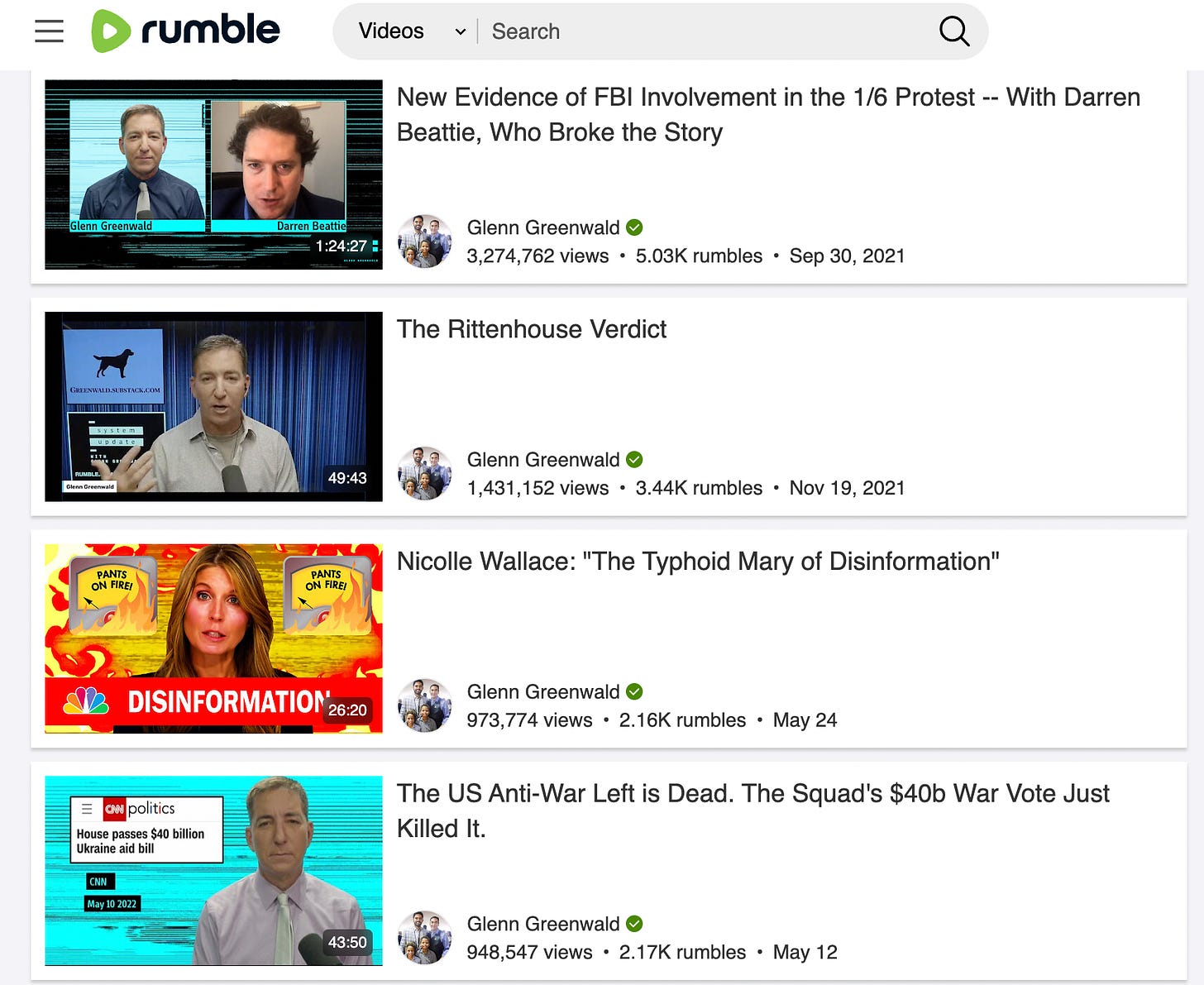
(Notably, The Washington Post article announcing our move attempted to disparage Rumble as a toxic sewer of disinformation. To do so, it cited one of those benign-sounding groups — what The Post heralded as “the Institute for Strategic Dialogue, a counter-extremism think tank in London” — to call Rumble “one of the main platforms for conspiracy communities and far-right communities in the U.S. and around the world.” As I documented in a detailed video report on Rumble, that “Institute” cited by the Post as its disinformation expert is one funded by and serves as a partner to the U.S. and UK Security states as well as Big Tech itself. In other words, the Post unwittingly illustrated how this sham "disinformation” industry is weaponized by institutions of establishment power to deceive the public into believing that their decrees are apolitical proclamations based in science rather than what they are: extremely politicized schemes on behalf of Western power centers designed to make crude censorship appear enlightened and scientific.)
This stunning success over the past year — with audience sizes that would make many cable programs envious — has led us and Rumble to now enter into a far more sweeping, ambitious and exciting commitment. As part of a new live network of news shows that Rumble will host on its platform, we will be very imminently launching a new and radically expanded version of “System Update.” Our broadcast now will be a one-hour, nightly news and commentary show that will air live, exclusively on Rumble's platform, from Monday to Friday at 7:00 pm ET. At the end of each program on Rumble, I will move to my dedicated community page on Locals — the platform recently purchased by Rumble that is designed to build communities of content and commentary (more about that later) — where I will continue the live broadcast for subscribers only, for roughly 20-30 minutes, by answering questions about the show, engaging critiques and suggestions, and otherwise directly interacting with our audience.
Anyone who is a paid subscriber here on Substack will have the automatic right to also become a subscriber to our Locals community, free of cost or charge. In other words, if you already purchased a yearly subscription here at Substack, you will continue to have full access to all of my written journalism here, and will also have full access to everything we do at Locals, including the after-show that is exclusively for audience interaction with our subscribers. However much time you have left on your Substack subscription — for instance, those who purchased a one-year Substack subscription in June and thus have eight months remaining on their Substack subscription — will automatically receive eight months of free subscription to our Locals community. Anyone here who purchases their Substack subscription on a monthly basis will be able to do the same on Locals.
The new network of live one-hour shows on Rumble already launched when Russell Brand debuted his new live show, "Stay Free,” on Rumble on September 28. Many of his shows, after less than a month, are already attracting an audience size of 250,000 views or more (I was one of the guests on his debut show, starting at 41:00, where we discussed the purpose and goal of these new shows). Rumble will shortly be unveiling other hosts who have similarly heterodox and independent views. On September 8, The Wall Street Journal broke the story of the new network of shows Rumble is committing to, and it includes many details about our new upcoming program.
Our new live program was originally scheduled to launch on September 10, but was delayed due to the ongoing health crisis in my family which I have discussed several times here. That health crisis has unfortunately not yet resolved itself, and that makes it quite difficult for me to commit to a concrete launch date for the show because, to be honest, there are days when I am simply not equipped to work, and I do not want to launch the show until I am confident I can produce five nights of high-quality live programming.
We are, however, extremely excited by the new show. Rumble — knowing that we need to produce very high-quality shows if we want people to turn off CNN and other corporate television networks and watch our shows instead — has provided very sizable production budgets. That has allowed us to build a new state-of-the-art studio where our show will be hosted, and to hire a large studio team to produce the show with the same technical quality that one would expect to find on any other prime-time television show.
Until we can commit to a definitive launch date — meaning when our family is whole again and I am not spending significant parts of my days speaking with teams of doctors and ICU nurses — we are instead going to produce a “soft launch” of the show. To do that, we will very shortly — within the next couple of weeks — begin broadcasting our live show not yet on Rumble but on our Locals page. In other words, for the first couple of weeks, as we work out the kinks in the show and do the kind of test run we would do in any event, we will produce our show for the first couple of weeks exclusively for our Substack and Locals subscriber base. That will enable you to be part of the process as we develop the show, to provide feedback on how to make it better, and to begin watching what we believe and expect from the start will be very high-quality news, reporting and commentary. I would not put anything on the air, even as part of a “soft launch,” that I did not have pride and belief in.
In so many ways, this show is a new and significant challenge for me. We have committed to producing a one-hour live program five nights a week. The show will begin with an in-depth monologue (up to twenty minutes) that is similar in kind to the evidence-heavy presentations we have been producing as part of our periodic System Update programs on Rumble now. The second segment will entail an in-depth interview of roughly twelve to fifteen minutes with a political official, a journalist, or someone who otherwise has something original and informative to say. The third segment will be devoted to covering the top two or three new stories of the day — including with live on-the-scene reporters — but we will cover these stories in a much different way, with a different voice and perspective, than what you would expect to see by turning on your television to watch corporate news. And the last part of the show will consist of a regular, rotating series of topics and segments as we transition into the live, audience-participation after-show on Locals.
Written journalism has always been the foundation of how I participate in our discourse and that will continue. But this new live program will enable me to reach entirely new audiences (many people now, especially but not only younger people, will only consume news through video), and to do reporting and construct analyses using the most potent technological tools. I am convinced it will do nothing but expand the reach and impact of the journalism I already do here.
While the show will be part of a new network of shows hosted on Rumble's platform, it is not a Rumble show. By that, I mean that — unlike other programs that appear on television — we will not exist within or report to any corporate management or corporate structure. Rumble has no interest in producing news and political programming, only in providing an ideologically-neutral and content-neutral free speech platform that enables everyone to speak and be heard freely. Rumble thus does not have any editorial managers or any other executives who can be or want to be in a position of overseeing anyone's content. Our contract provides that we have full, complete and unlimited editorial freedom and journalistic independence; Rumble has no desire and no ability to review any of our shows; and our contract is guaranteed and cannot be terminated due to the disagreement with or objections to any of our viewpoints, content or reporting.
Ultimately, no contract in the world can really guarantee one's editorial freedom (as I learned when The Intercept brazenly violated the contractual right I enjoyed since I co-founded the site in 2013 to publish my reporting directly to the internet without any editorial interference or control, editorial censorship which led me to quit and come to Substack almost two yeas ago to this day). These kinds of relationships require trust, and I have absolute trust in the commitment of the founders and managers of Rumble to devote the site to values of free speech. Even if they were not genuinely committed to these values as a cause — and they are — they know that Rumble's self-interest requires the fulfillment of its commitments to free speech since the reason for Rumble's success is precisely that it is becoming the free speech alternative to Google's YouTube.
Once we have our date for the soft-launch of our show on Locals, we will notify all subscribers here. All one needs to access our Locals community — and thus have exclusive viewing rights to the first couple of weeks for our debut as well as the right to watch and participate in the after-show on Locals — is a current Substack subscription. Those of you who are already paid subscribers here will not need to do anything other than opt-in to your new free Locals subscription when we send that email announcing our launch date. But the show itself — once it debuts in its nightly form on Rumble — will be freely available to the public at large: no subscription required. Our primary goal — after producing high-quality journalism and broadcast programming — is to reach as large an audience as possible. We do not want to be paywalled and thus reduce the reach of our work.
Complaining about, denouncing and even protesting the escalating censorship regime in the West will not stop it or even impede its growth. What will do so is the creation and growth of platforms that are committed to free speech and which are fully fortified in all ways — ideologically, politically and technologically — to resist encroachments into our most basic right: the right to freely express ourselves, to freely communicate with one another, and to freely challenge, question and dissent from the policy agendas, dictates and decrees of institutions of authority. Free speech platforms like Rumble, and our new live nightly "System Update” program on it are, above all else, dedicated to advancing this central cause.
To support the independent journalism we are doing here, please subscribe, obtain a gift subscription for others and/or share the article:




